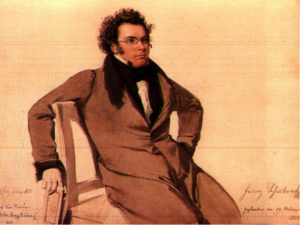Contribution to the celebration of the 50th anniversary of Mr von Salieri's appointment
(Poet's title: Beitrag zur fünfzigjährigen Jubelfeier des Herrn von Salieri)
Set by Schubert:
D 407
for TTBB quartet and piano[June 16, 1816]
Gütigster, Bester!
Weisester, Größter!
So lang ich Tränen habe,
Und an der Kunst mich labe,
Sei beides dir geweiht,
Der beides mir verleiht!
So Güt’ als Weisheit strömen mild
Von dir, o Gottes Ebenbild,
Engel bist Du mir auf Erden;
Gern möcht ich dir dankbar werden.
Unser aller Großpapa,
Bleibe noch recht lange da!
Most gracious, the best!
The wisest, the greatest!
For as long as I have tears
And I refresh myself with art,
Let both of them be dedicated to you,
Since I owe them both to you.
Both goodness and wisdom pour out gently
From you, the very image of God,
You are an angel on earth for me.
I am keen to express my gratitude to you.
For all of us you are Grandpapa,
Stay here for a lot longer!
All translations into English that appear on this website, unless otherwise stated, are by Malcolm Wren. You are free to use them on condition that you acknowledge Malcolm Wren as the translator and schubertsong.uk as the source. Unless otherwise stated, the comments and essays that appear after the texts and translations are by Malcolm Wren and are © Copyright.
☙
Themes and images in this text:
Schubert first met Salieri in 1804 (aged only 7). It was Salieri who recommended that the young Schubert join the Imperial choir in Vienna and he began giving him private tuition in 1812. The lessons continued even after Schubert left the Konvikt school in 1813 and Salieri wrote a reference in support of Schubert’s (unsuccessful) application for a teaching job in Ljubljana in April 1816.
The following account of the celebrations on 16th June 1816 is from Otto Erich Deutsch’s Schubert: A Documentary Biography (translated by Eric Blom, 1946), page 63
The fiftieth anniversary celebrated was that of Salieri's arrival in Vienna. It fell on a Sunday. After a service attended at the Italian Minorite Church with his four daughters Salieri went to the Lord High Chamberlain, Prince Trauttmansdorff, who presented him with the civil gold medal of honour in the emperor's name and in the presence of Count Kuefstein, the musical representative of the court, and the staff of the Court Chapel. Salieri then conducted high mass in the Court Chapel with music of his own, and this was followed by luncheon in the company of his children and several friends. In the evening the celebration arranged by his pupils took place in Kuefstein's presence at Salieri's home. He sat at the pianoforte, surrounded by his past and present pupils in two semicircles, fourteen women on this right and twelve men on his left. Hummel and Moscheles, who were not in Vienna, had sent vocal compositions, and each of the pupils present had brought a dedicatory composition.
The same source provides a translation of Schubert’s diary entry for that date:
It must be beautiful and refreshing to see all his pupils gathered about him, each one striving to give of his best for his jubilee, and to hear in all these compositions the expression of pure nature, free from all the eccentricity that is common among most composers nowadays, and is due almost wholly to one of our greatest German artists [Beethoven?]; that eccentricity which joins and confuses the tragic with the comic, the agreeable with the repulsive, heroism with howlings and the holiest with harliquinades, without distinction, so as to goad people to madness instead of dissolving them in love, to incite them to laughter instead of lifting them up to God. To see this eccentricity banished from the circle of his pupils and instead to look upon pure, holy nature, must be the greatest pleasure for an artist who, guided by such a one as Gluck, learned to know nature and to uphold it in spite of the unnatural conditions of our age. - Herr Salieri celebrated his jubilee yesterday, having been fifty years in Vienna and nearly as long in the imperial service; he was awarded a gold medal by His Majesty and invited many of his pupils, male and female. The works written for the occasion by his composition students were performed from top to bottom, according to the order in which they came under his tuition. The whole was framed with a chorus and an oratorio, 'Jesu al Limbo', both by Salieri. The entertainment interested everybody.
☙
Original Spelling Beytrag zur fünfzigjährigen Jubelfeyer des Herrn von Salieri Gütigster, Bester! Weisester, Größter! So lang ich Thränen habe, Und an der Kunst mich labe, Sey beydes Dir geweiht, Der Beydes mir verleiht! So Güt' als Weisheit strömen mild, Von Dir, o Gottes Ebenbild, Engel bist Du mir auf Erden; Gern möcht' ich Dir dankbar werden. Unser aller Großpapa, Bleibe noch recht lange da!
Confirmed by Peter Rastl with Franz Schubert’s autograph (Bibliothèque Nationale, Paris).


